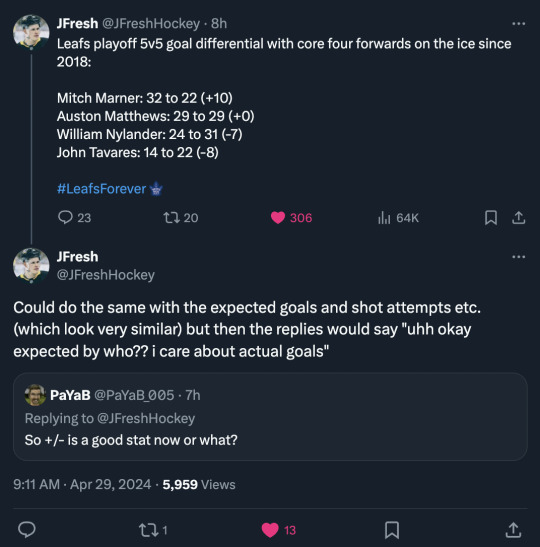#defenders alliance
Text

finally working on some new stuff >:) this blog shall return soon...
#heroes and villains#writeblr#defenders alliance#hero and villain#i'm going to try to do follow ups to everything but if there's anything in particular you're dying to see more of feel free to let me know
3 notes
·
View notes
Text
my dear siblings in arms
last night we gained an unlikely but welcome ally for the mitch marner defense squad
he showed up in a cloud of mist then leapt into hand-in-hand combat vs. the leafs uncles who want to do a variety of things to mitch, ranging from cyberbullying him out of town to "healthy scratch[ing] him for 2 months so he wants to leave" (an actual idea someone thought to post publicly).
without further ado, i present: [cue gladiator soundtrack]
Jfresh.













some additional observations:
if u look at the timestamps for these he was fully in the trenches battling from 3pm-1am.
his calm replies make the uncles look even more obtusely deranged than they already are
he may be doing this with the ulterior motive of trying to get mitch on the penguins and honestly....let's fuckin go
#mitch marner#jfresh why were you posting core four playoff stats to defend mitch marner at 1am are u just like me? ur just like me#the idea that you flip to the postseason and he's a liability is idiocy#CACKLIN#it's a fleeting alliance but i'll take it#fleeting but mutually useful alliances are how wars are won
425 notes
·
View notes
Text






This is definitely a trend for the hateful, christofascist, religious reich. Hobby Lobby did the same thing at previous Super Bowls.


It’s right wing, Islamophobic, homophobic, anti-abortion Christian nationalism, masquerading as “caring” religion.

The Servant Foundation: the power behind the ads
The $20 million "He Gets Us" campaign about Jesus - is funded by an influential donor to some of the most active and litigious Shadow Network groups working to undermine church-state separation.
The Servant Foundation
The Servant Foundation, also known as The Signatry, is behind the “He Gets Us” ad campaign that debuted during the 2023 Super Bowl. Over the next three years, the Servant Foundation plans to spend “about a billion dollars” toward this public relations campaign. They’ve hired a PR firm to address, in the firm’s words, the problem of “How did the world’s greatest love story in Jesus become known as a hate group?”
Of course, they’re the cause of their own problem – not only has the Servant Foundation funded hate groups, but the PR firm, Haven, has represented these organizations. Key Shadow Network members Focus on the Family and Alliance Defending Freedom are in their portfolio. ADF is a noted anti-LGBTQ hate group that has argued repeatedly in courts that religion, and specifically Christianity, is a license to discriminate; they have one such case pending before the Supreme Court right now.
The money trail
The Servant Foundation is one of ADF’s biggest financial backers. A recent exposé reports that, “between 2018-20, the Servant Foundation donated more than $50 million to the Alliance Defending Freedom and that those contributions “were among the five largest donations given out by the foundation in each of those three years.”
Other recipients of the Servant Foundation’s billion dollars in assets include:
Nearly $8 million went to Answers in Genesis, creationist Ken Ham’s fundamentalist ministry behind the Creation Museum and Ark Encounter, an organization that has been championed by Speaker of the House Mike Johnson, a former ADF attorney.
Over $1 million was designated for the anti-LGBTQ Campus Crusade for Christ (rebranded as “Cru” since 2011).
$374,800 went to Al Hayat Ministries, an organization that seeks to “respectfully yet fearlessly unveil the deception of Islam,” and runs an Arabic-language Christian satellite TV station with the goal of converting Muslims to Christianity.
In 2020 alone, we found donations to prominent Shadow Network members American Center for Law and Justice, First Liberty Institute, and Liberty Counsel.
(continue reading)
#politics#super bowl#republicans#christian nationalism#lgbt#homophobia#christofascism#religious reich#lgbtq#jesus gets us#the servant foundation#no hate like christian love#the signatry#alliance defending freedom#adf
184 notes
·
View notes
Text
really funny that clethubs has gotten way more popular this season considering bdubs has been WAY more of a petty bitch than usual 😭
#said with love. im a big fan drama and lying. etc#it's still so fucking funny though. he regifts half the stuff etho n cleo give to him. constantly talks abt how awful they are to him#<- the latter of which is blatantly untrue. which cleo TELLS HIM. and he can't even think of anything to defend himself 😭😭😭😭#the one season in which he's actively being invited to an alliance and he's like FUCKKKKKKKK.#mfw i commit myself to a new alliance for once and then when i'm offered a chance to return to old loyalties i respond with hostility 🤦♀️#because god forbid. god forbid
101 notes
·
View notes
Text
How one Christian legal group is shaping policy, from abortion to LGBTQ rights : NPR
The Alliance Defending Freedom has won 15 Supreme Court cases, including overturning Roe v. Wade. New Yorker writer David Kirkpatrick explains the group's influence and their next targets
127 notes
·
View notes
Text
Michigan Gov. Gretchen Whitmer (D) signed a law on Monday that adds crucial protections for LGBTQ+ couples using fertility treatments to build a family.
The Michigan Family Protection Act includes a series of provisions to protect families of all kinds. Most notably for the LGBTQ+ community, it changes “outdated state law to treat LGBTQ+ families equally and eliminate the need for them to go through a costly and invasive process to get documentation confirming their parental status,” as a press release from the governor’s office explains, adding that “Even if they move to a state that does not respect these basic rights, these bills help ensure they cannot be denied their relationship to their child.”
The law also repeals a law that made Michigan the only state in the country to criminalize surrogacy contracts; increases protections for surrogates, parents, and children; ensures equal legal treatment of children born through surrogacy and assisted reproduction; and streamlines the process for families to establish legal connections to their children.
“The Michigan Family Protection Act takes commonsense, long-overdue action to repeal Michigan’s ban on surrogacy, protect families formed by IVF, and ensure LGBTQ+ parents are treated equally,” Gov. Whitmer said in a statement. “Your family’s decisions should be up to you, and my legislative partners and I will keep fighting like hell to protect reproductive freedom in Michigan and make our state the best place to start, raise, and grow your family.”
Stephanie Jones, founder of the Michigan Fertility Alliance, called the legislation “an incredible victory for all Michigan families formed through assisted reproduction, including IVF and surrogacy, and for LGBTQ+ families.”
The press release also acknowledged the attacks on reproductive rights taking place across the country, most notably the 2022 overturning of Roe v. Wade and the 2024 Alabama Supreme Court’s declaration that embryos created through IVF have the same legal rights as children.
“As other states seek to restrict IVF, ban abortion, and make it harder to start a family, Michigan is supporting women and protecting reproductive freedoms for everyone,” the release stated.
One fierce advocate, Tammy Myers, has been fighting for the decriminalization of surrogacy in the state for the past four years. She told 7 Action News, “The tipping point, I think, is seeing that rights are being taken across the nation and we all need to fight for reproductive freedom.”
Polly Crozier, director of family advocacy at GLBTQ Legal Advocates & Defenders (GLAD), added in a statement, “Michigan has shown us what strengthening families should look like in 2024: making it more possible for people to fulfill their dreams of building a family and more accessible for all families, including LGBTQ+ families, to obtain the safety and stability that comes with legal parentage.”
“Amid efforts to restrict Americans’ reproductive freedom and roll back protections for LGBTQ+ people and their families, the Michigan Family Protection Act is an inspiring example for other states where gaps in parentage laws leave families vulnerable.”
#us politics#news#lgbtq nation#lgbtqia+ rights#equality#Gov. Gretchen Whitmer#Michigan#2024#Michigan Family Protection Act#ivf#ivf treatment#surrogacy ban#surrogacy#assisted reproduction#reproductive rights#reproductive health#lgbtqia+#Stephanie Jones#Michigan Fertility Alliance#Tammy Myers#7 Action News#GLBTQ Legal Advocates & Defenders#Polly Crozier#in vitro fertilization
51 notes
·
View notes
Text
These "expert" pediatricians were paid by a far-right legal group to come up with evidence to attack the WPATH transgender standards of care
What this is: Leaked documents show the anti-LGBT legal group Alliance Defending Freedom paying manufactured experts to attack WPATH’s transgender standards of care, asking them to find evidence for harmful anti-trans myths that they knew were baseless and unsubstantiated. This is an original finding and report by Zinnia Jones (she/her), a transgender Florida resident of 11 years whose access to HRT is now jeopardized by the enactment of state law and policy based on work from these same experts.
Detailed summary: From 2019 onward, states across the US have been faced with an intensely active wave of reused anti-trans experts, recurring characters who keep repeating the same spurious arguments against gender-affirming care in court cases, legislatures, and other policy bodies. Where did they come from, and why did this start happening?
Due to the Florida-based anti-LGBT hate group American College of Pediatricians choosing to set one of their Google Drive folders to be publicly viewable by anyone, files were released this month showing the contents of their staff’s communications and other working notes over several years.
These documents included records of the Alliance Defending Freedom - another hate group who are also responsible for bringing the mifepristone case with ACP as a plaintiff - approaching ACP's leaders in 2018 and 2019 to offer them a grant of $10,000 or more. The ADF wanted the pediatricians “to draft a white paper that refutes the WPATH Standards of Care”, “for use in litigation and should also benefit many other allies at State and Federal Level”.
ACP’s president Quentin Van Meter and executive director Michelle Cretella promptly got to work on this “Special Project”, and the ADF hosted expert witness workshops at ACP's conferences. ACP members including Van Meter went on to present anti-trans testimony in several ADF-litigated cases and ADF-involved trans youth care bans.
In May 2022, Van Meter authored a sham report for Florida Medicaid to justify their trans coverage exclusion, mostly drawing from previous ACP position statements; court filings later revealed Michelle Cretella was recommended by the Florida governor’s office, and she pointed the way to all the other anti-trans experts hired by Florida in 2022 to support the Medicaid exclusion of transition care.
One notable document found in the ACP’s drive contains “Transgender Research Requests”, with the ADF asking Cretella and other ACP leaders to “substantiate” now-commonplace anti-trans talking points. These included bizarre claims by the ADF such as “it is normal during adolescence for children to go through a phase when they identify (to some degree) with the opposite sex”, and “For those who have undergone hormone therapy and genital change surgery, a paper that says they are no happier (and perhaps worse off if the research supports it)”.
The ADF was asking this anti-trans group to come up with anything that could support the arguments they were already planning to make.
This appears to be one of the very sites where those baseless myths about suicide, social contagion and other supposed harms, now regularly repeated in court cases and testimony and uncritically accepted by the mainstream right wing, were conceived and gestated.
These same experts then substantially reused these work products in their reports for Florida Medicaid, a public health agency whose accepted standards determination process is supposed to be a transparent and open-ended evaluation of peer-reviewed medical evidence.
Altogether, these documents appear to demonstrate a paid smear by a hate group and right-wing law firm against a leading professional transgender healthcare organization following the best available evidence and medical practices, as well as misconduct on the part of ACP experts who reused this work in their reports for a Florida public health agency.
(asks are open)
#transphobia#transgender#trans#Florida#Florida Medicaid#trans youth care ban#trans care ban#Alliance Defending Freedom#American College of Pediatricians#LGBT#tw transphobia#tw homophobia#Ron DeSantis#Florida GOP#SB 254
253 notes
·
View notes
Text
Why the fuck is Morgan suddenly the mind behind the Tie Defenders? Like Thrawn is not the type of person to steal ideas, he would have mentioned that SHE designed it. And y tf is Rukh suddenly so fucking buff??? Like since when. He was a little strong scrangly scrawny boi in rebels like wtf??? Plus wasn't Pellaeon working in Grand Admiral Savit at this point? It think he joined Thrawns fleet at the end of Treason. Honestly Filoni needs to read a Thrawn book. Bros ruining a already mazing character. Making me happy Eli and Karyn didn't come.
#star wars#eli vanto#thrawn#grand admiral thrawn#thrawn trilogy#thrawn books#star wars thrawn treason#thrawn alliances#eli n vanto#thrawn 2017#karyn faro#mitthrawnuruodo#grand admiral savit#rukh#morgan elsbeth#tie defender#gilad pellaeon#star wars#star wars rebels#sw rebels#swr#rebels
28 notes
·
View notes
Text
Sarah Posner for TPM:
I am a journalist who has covered the Christian right for two decades. Over the past three years, I began to more frequently use the term “Christian nationalism” to describe the movement I cover. But I did not start using a new term to suggest its proponents’ ideology had changed. Instead, the term had come into more common usage in the Trump era, now regularly used by academics, journalists, and pro-democracy activists to describe a movement that insists America is a “Christian nation” — that is, an illiberal, nominally democratic theocracy, rather than a pluralistic secular democracy.
To me, the phrase was highly descriptive of the movement I’ve dedicated my career to covering, and neatly encapsulates the core threat the Christian right poses to freedom and equality. From its top leaders and influencers down to the grassroots — politically mobilized white evangelicals, the foot soldiers of the Christian right — its proponents believe that God divinely ordained America to be a Christian nation; that this Christian nation has come under attack by liberals and secularists; and that patriotic Christians must engage in spiritual warfare to rid America of demonic forces, and in political action to restore its Christian heritage. That includes taking political steps — as a voter, as an elected official, as a lawyer, as a judge — to ensure that America is governed according to a “biblical worldview.”
If you want to see that definition in action, look no further than the career of House Speaker Mike Johnson. Seventeen years ago, when I interviewed Johnson, then a lawyer with the Christian right legal powerhouse Alliance Defending Freedom, I would have labeled him a loyal soldier in the Christian right’s legal army trying to bring down the separation of church and state. He is a product of and a participant in a sprawling religious and political infrastructure that has made the movement’s successes possible, from politically active megachurches, to culture-shaping organizations like Focus on the Family, to political players like the Family Research Council, to the legal force in his former employer ADF.
In today’s parlance, Johnson is a Christian nationalist — although he, like most of his compatriots, has certainly not embraced the label. But Mike Johnson the House Speaker is still Mike Johnson the lawyer I interviewed all those years ago: an evangelical called to politics to be a “servant leader” to a Christian nation, dedicated to its governance according to a biblical worldview: against church-state separation, for expanded rights for conservative Christians, adamantly against abortion and LGBTQ rights, and especially, currently, trans rights.
That mindset is still the beating heart of the Christian right, even as the movement, and other movements in the far-right space, have radicalized in the Trump era, taking on new forms and embracing a range of solutions to the apocalyptic trajectory they see America to be on. Different movements imagining a version of Christian supremacy exist side by side — different strains that often borrow ideas from one another, and that fit comfortably under the banner of Christian nationalism.
The term “Christian nationalism” became popularized during Trump’s presidency for a few reasons. First, Trump, who first ran in 2016 on a nativist platform with the nationalist slogan “Make America Great Again,” was and still is dependent on white evangelicals to win elections and maintain a hold on power. He is consequently willing to carry out their goals, bringing their ambitions closer to fruition than they’ve ever been in their 45-year marriage to the Republican Party. They have been clear, for example, in crediting him for the downfall of Roe v. Wade, among other assaults on other peoples’ rights.
Second, the prominence of Christian iconography at the January 6 insurrection, and the support for Trump’s stolen election lie before, during, and after January 6 by both Christian right influencers and the grassroots, brought into stark relief that Christian nationalist motivations helped fuel his attempted coup.
Finally, sociologists studying the belief systems of Christian nationalists pushed the term into public usage, as did anti-nationalist Christians, especially after January 6, in order to elevate awareness of the threats Christian nationalism poses to democracy. (The paperback edition of my book, Unholy, which was published in mid-2021 and included a post-January 6 afterword, reflected the increasing usage of the term Christian nationalists by including the term in a fresh subtitle.)
The Trump era, along with the rise of openly Christian nationalist social media sites like Gab, and Elon Musk’s takeover of Twitter, have given space for otherwise unknown figures, like the rabidly antisemitic Gab founder Andrew Torba, co-author of the book Christian Nationalism: A Biblical Guide For Taking Dominion And Discipling Nations, and Stephen Wolfe, author of the racist book The Case for Christian Nationalism, to enter the Christian nationalism discourse. Although Torba and Wolfe have made waves online, and extremism watchers are rightly alarmed that their tracts could prove influential and radicalizing, they remain distinct from the Christian right.
[...]
The conventional Christian right does not want a parallel society or a divorce. They believe they are restoring, and will run, the Christian nation God intended America to be — from the inside. They will do that, in their view, through faith (evangelizing others and bringing them to salvation through Jesus Christ); through spiritual warfare (using prayer to battle satanic enemies of Christian America); and through politics and the law (governing and lawmaking from a “biblical worldview” after eviscerating church-state separation). Changes in the evangelical world, particularly the emphasis in the growing charismatic movement on prophecy, signs and wonders, spiritual warfare, the prosperity gospel, and Trumpism, has intensified the prominence of the supernatural in their politics, giving their Christian nationalism its own unmistakable brand.
For decades, Christian right has been completely open about their beliefs and goals. Their quest to take dominion over American institutions by openly evangelizing and instituting Christian supremacist policies sets the Christian right apart from other types of Christian nationalists who might operate in secret, or imagine utopian communities as the ideal way to save themselves from a secular, debauched nation.
The fact that far-right extremists like Torba or Wolfe embrace the Christian nationalist label gives the more conventional Christian right leaders and organizations space to disassociate themselves from it. Some also berate journalists who use it to describe them, accusing them of hurling a left-wing slur at Christians.
The bottom line is that Christian nationalism takes on different forms, and despite organizational or even ideological differences, ideas can penetrate the often porous borders between different camps. Someone who receives the daily email blast from the Family Research Council might also be drawn to Wolfe’s book, for example. On a more unnerving, macro level, major right-wing and GOP figures, including Marjorie Taylor Greene and the CEO of the Daily Wire, the podcast consortium run by conservative influencer Ben Shapiro, have embraced the rabidly antisemitic, Hitler-admiring antagonist Nick Fuentes, who is Catholic but also is accurately described as a Christian nationalist. The increasingly influential Catholic integralist movement, which seeks a Catholic-inflected replacement for the “liberal order,” is yet another unique form of Christian nationalism.
Sarah Posner wrote for TPM about the variants of Christian Nationalism within the larger Christian Right movement.
#Donald Trump#Christian Nationalism#Christian Right#Mike Johnson#Alliance Defending Freedom#Focus On The Family#Family Research Council#Andrew Torba#Stephen Wolfe#Nick Fuentes
32 notes
·
View notes
Text

Vader, your Anakin is showing
#star wars#anakin skywalker#darth vader#thrawn#jedi#galactic empire#tie defender#chiss#thrawn alliances#timothy zahn#star wars books#my post
68 notes
·
View notes
Text
On one hand I understand not making the Aeons playable makes them seem even more powerful and otherwordly, and also gives Hoyo more creative freedom with their designs.
On the other I would sell my soul, my firstborn, and both kidneys for Yaoshi on my team.
#crying screaming throwing up at the fact that we side against The Abundance#LIKE NO LET ME WORSHIP MY SANCTUS MEDICUS IN PEACE#me joining the cult like ''are you here for immortality'' ''screw that I just wanna see Yaoshi''#this while also choosing The Hunt in simulated universe all the time. the irony. the pain.#but still. lorewise I got beef with The Alliance. leave my aeon ALONE they did nothing wrong ever#''oh they cursed us'' bbg you cursed yourselves don't ask for rain and cry because you're wet#if Yaoshi has no defenders I am DEAD BURIED AND BRICKED#cube.rambles
28 notes
·
View notes
Text



These are the pictures I drew after soliciting requests.
#mortal kombat#mortal kombat deadly alliance#mortal kombat defenders of the realm#mortal kombat deception#shang tsung#princess kitana#kitana#havik
128 notes
·
View notes
Text






when i am placed into hell via the death gacha i assume the top reason will be 'world of warcraft pvp'
#world of warcraft#ive been leveling alliance characters so its so thrilling to see the different types of people.#alliance will defend each other so much faster than horde meanwhile on horde if someone insults someone the whole bg is gonna kill each oth#alliance is like noooo not my besties we're all brother in arms. WRONG. i am afk playing granblue fantasy on my phone if we're losing.
50 notes
·
View notes
Text

















Kitana through the ages in Mortal Kombat
My fav design of Kitana is probably a tie between MK11 and MKXL
#Kitana#mortal kombat#mortal kombat 2#mortal kombat 1#mortal kombat deadly alliance#mortal kombat 9#mortal kombat XL#Mortal Kombat 11#mortal kombat defenders of the realm#mortal kombat annihilation#mortal kombat vs dc universe#Ultimate Mortal Kombat 3#Mortal Kombat Gold
44 notes
·
View notes
Text

Star Wars: Battlefront - Rogue One: Scarif (2016)
#2016#gaming#Star Wars#Battlefront#Rogue One#Scarif#Galactic Empire#Rebel Alliance#Director Orson Krennic#Orson Krennic#Jyn Erso#Nien Nunb#Citadel#coastal defender stormtrooper#shoretrooper
18 notes
·
View notes
Text
Revs. Jan Barnes and Krista Taves have logged hundreds of hours standing outside abortion clinics across Missouri and Illinois, going back to the mid-1980s. But unlike other clergy members around the country, they never pleaded with patients to turn back.
The sight of the two women in clerical collars holding up messages of love and support for people terminating a pregnancy “so infuriated the anti-abortion protesters that they would heap abuse on us and it drew the abuse away from the women,” recalled Taves, a minister at Eliot Unitarian Chapel in Kirkwood, Missouri, as she sat on a couch at Barnes’ stately church in this quiet suburb of St. Louis.
“I thought: ‘Whoa, these people really are not messing around.’ But then I thought, ‘Well, I’m not messing around either.’”
So when Missouri’s abortion ban took effect after the Supreme Court overturned Roe v. Wade last year, Barnes and Taves decided to fight back. Along with rabbis and ministers across several denominations, they joined a first-of-its-kind lawsuit arguing Missouri blurred the line between church and state, imposed a particular Christian idea of when life begins over the beliefs of other denominations, and threatened their ability to practice their religions.
As the nation nears the one year anniversary of the fall of Roe, the Missouri case is one of nearly a dozen challenges to abortion restrictions filed by clergy members and practitioners of everything from Judaism to Satanism that are now making their way through state and federal courts — a strategy that aims to restore access to the procedure and chip away at the assumption that all religious people oppose abortion.
In fact, many of the lawsuits are wielding religious protection laws enacted by anti-abortion state officials to target those officials’ own restrictions on the procedure.
In Indiana, a group of Jewish, Muslim and other religious plaintiffs sued over the state’s near-total abortion ban. Their argument: that it violates the Religious Freedom Restoration Act signed into law in 2015 by then-Gov. Mike Pence. A lower court judge sided with them in December and blocked the state’s ban from taking effect — the most significant win the religious challengers have notched so far.
Then, earlier this month, the Indiana judge granted the challengers class action status, meaning a win for them could apply to anyone in the state whose religion supports abortion access in cases prohibited by state law.
“Even if the Religious Freedom law was intended by Mike Pence to discriminate against people, we thought: ‘Let’s use this for good instead,’” said Amalia Shifriss, a leader of Hoosier Jews for Choice, one of the Indiana plaintiffs. “It brings me joy to think how much this must upset him.”
A Pence spokesperson characterized the lawsuit as a “pursuit to legalize abortion up to and even after birth.” They added: “It will probably strike Americans as pretty tasteless to call the latest iteration of their abortion crusade as a cause ‘for good’ and a source of ‘joy.’”
Conservatives with a history of mounting their own religious challenges to state laws dismiss the effort as doomed to fail, arguing that even if people can prove the abortion bans violate their beliefs, it won’t be enough to halt enforcement.
“As Justice Ruth Bader Ginsburg explained in one Free Exercise case, the right to swing your arm ends just where the other man’s nose begins,” said Denise Harle, senior counsel with Alliance Defending Freedom, a conservative legal group that has filed briefs defending state abortion restrictions, including from faith-based challenges in Wyoming and Florida. “Even if you have religious freedom, there is a line at which you are doing actual deadly harm and destroying human life, so it’s appropriate to limit what can be done in the name of religion.”
But with oral arguments and rulings in several of the cases expected this summer and fall, other legal experts say there’s a solid chance the challengers can persuade courts to grant religious exemptions to abortion bans if not strike them down altogether.
Shlomo C. Pill, a lecturer at the Emory University School of Law who specializes in religious rights, said the lawsuits have “a strong basis and should be successful,” particularly after a series of COVID-19-related cases paved the way for more religious exemptions. Pill pointed to multiple Supreme Court decisions during the pandemic that said whenever states create secular exemptions to laws — like indoor gathering restrictions or vaccine mandates — they have to justify not offering religious exemptions as well.
“So the fact that secularly-motivated exemptions to abortion bans exist — such as for rape and incest — means the legislature could also have to offer similar exemptions for people with religious objections,” he said.
‘REAL CHUTZPA’
Most of the cases, including those in Indiana, Kentucky, and Texas, are demanding exemptions from the bans for people whose religions support abortion rights. But a few, including the lawsuits in Florida, Missouri and Wyoming, are attempting to have the bans struck down entirely.
In Missouri, the plaintiffs argue that because lawmakers put religious language in the text of the abortion ban itself and made explicit religious appeals when voting on it, they violated the Establishment Clause.
“It took real chutzpah for the legislators to voice their own religious motivations, to wantonly and shamelessly purport to know what God wants or doesn’t want and to enshrine that into law,” said Rabbi James Bennett of Congregation Shaare Emeth in St. Louis, another plaintiff in the Missouri lawsuit. “They’re entitled to their interpretation of when life begins, but they’re not entitled to have the exclusive one.”
Last week, the group faced off in a St. Louis courtroom with state officials who are pushing to have the case thrown out. A ruling could come as soon as this summer.
In Florida, clergy representing Reform Judaism, Buddhism, the Episcopal Church, the United Church of Christ and the Unitarian Universalist Church sued in state court both to overturn the state’s 15-week abortion ban, and — if that fails — to secure religious exemptions. Their case makes free speech arguments as well — claiming that state bans on “aiding and abetting” abortions are muzzling clergy members who want to offer counseling to parishioners grappling with whether to terminate a pregnancy.
In Kentucky, three Jewish women are arguing that the state’s near-total abortion ban violates their belief that life only begins when a baby takes its first breath, saying it’s preventing them from pursuing pregnancy through in-vitro fertilization.
“To have someone else’s religious belief that an embryo is a human being imposed on me in a way that’s so personal, that prevents me from growing my family, is just rude and un-American,” Lisa Berlow, the lead plaintiff in that case, said in an interview. Berlow had one child through IVF and was planning to have another before Dobbs made her and her fellow plaintiffs fear prosecution. “Discarding non-viable embryos could now be criminalized, or I could miscarry and not know what type of medical care I would get or whether I would be investigated for causing the miscarriage,” she said.
The Satanic Temple is in federal court challenging abortion bans in Texas, Idaho and Indiana, arguing that the laws infringe upon their congregants’ belief in bodily autonomy and right to practice abortion as a religious ritual. A Texas District Court ruled against the Satanists last fall, saying they didn’t prove the need for a temporary restraining order blocking enforcement of the ban against its members. The 5th U.S. Circuit Court of Appeals is poised to rule on the challenge in the coming weeks.
These cases are unlikely to restore abortion rights at the federal level given the weaker religious rights protections in the U.S. Constitution compared to many state constitutions as well as the federal judiciary’s rightward tilt.
Elizabeth Reiner Platt, director of the Law, Rights, and Religion Project at Columbia Law School, stressed that the Supreme Court has a record of protecting the religious rights of some groups and not others, pointing to its back-to-back decisions in 2017 upholding the right of a Christian baker to refuse to bake a cake for a same-sex wedding and allowing the right of the Trump administration to deny entry to travelers from majority-Muslim countries.
“While I don’t like to read the tea leaves, I don’t have any hope that the current Supreme Court would, after ruling that there was no due process right or privacy right to abortion, would find a right under the Free Exercise Clause or the Establishment Clause,” Platt said.
Still, she and other legal experts see the state-level religious challenges as one of the best chances abortion-rights advocates have to chip away at bans on the procedure.
“The arguments are quite powerful for creating religious exemptions in the reproductive context under First Amendment doctrine and under state laws for Free Exercise,” said Micah Schwartzman, director of the Karsh Center for Law and Democracy at the University of Virginia Law School. “What Judges do with them is another story.”
In order to succeed, these lawsuits must prove: that the right to an abortion is central to the religious practices of the people suing; that they are sincere in their beliefs and have a track record of observing them; and that state abortion bans make it impossible for them to live according to their faith.
The cases challenging abortion restrictions in their entirety face an additional hurdle: proving that state officials stepped over the line separating church and state in crafting the bans.
“We have a really strong Establishment Clause argument because it’s clear that these bills were passed for religious reasons,” said Marci Hamilton, a professor of constitutional law at the University of Pennsylvania who is part of the legal team representing clergy in Florida. “The 15-week bill was signed in a church and members of the state legislature repeatedly referred to God when arguing why this had to be done.”
Other experts are skeptical, however, of the strength of these arguments.
“There are a million-and-one other explanations a state could give for their abortion restrictions,” Pill said. “They could argue it’s a matter of secular conscience, for example. And once you have any kind of secular justification, an Establishment Clause argument becomes more difficult.”
For their part, the states defending their abortion laws and the conservative legal groups supporting them have to prove that they have a compelling interest — unrelated to religion — in protecting fetal life, that they’re using the least restrictive means to protect that interest, and that the challengers’ claims are speculative and premature because none of them have actually sought an abortion or been blocked from obtaining one since the laws took effect.
“I think these are much more like political stunts than they are viable court cases,” said Lori Windham, a vice president and senior counsel at the Becket Fund, the legal firm behind the Hobby Lobby case that secured a Supreme Court ruling allowing many employers to opt out of covering certain forms of birth control for their workers due to a religious objection. “You can have a sincere political belief or policy preference, and it can be passionate and deeply held, but that doesn’t make it a religious practice.”
CITING SCRIPTURE
Judges have historically avoided questioning the sincerity of someone’s religious beliefs, but Becket and other groups have filed amicus briefs that do so.
To combat these accusations, the challengers point to scripture that lays out a case for abortion rights as well as support from religious leaders for their claims.
The Jewish challengers in Kentucky cite religious texts including the Mishnah that say life begins when a baby takes its first breath, not when it is conceived, and if medical issues arise during pregnancy, the pregnant person’s life “comes before the life of [the child].” They also submitted to the court letters from rabbis arguing that current state exemptions for life-threatening medical emergencies aren’t enough, saying Jewish law permits, and in some cases requires, an abortion when there is “a risk of poverty, abuse, addiction, or mental illness.”
The case challenging Missouri’s ban cites the United Church of Christ’s vote in 1971 to acknowledge the right to abortion and members’ “autonomy to determine what happens to their own bodies,” as well as the Episcopal Church’s “long-standing opposition” to any government attempt to infringe on reproductive choices.
“There’s a tendency to see these cases as kind of a clever, legal switcheroo. Like, here’s a way to take these laws that are often thought of as very conservative and use them to protect abortion rights,” Platt said. “But the idea of reproductive rights as a religious liberty issue is absolutely not something that came from lawyers. It’s how faith communities themselves have been talking about their approach to reproductive rights for literally decades.”
#us politics#news#politico#2023#abortions#abortion bans#reproductive rights#reproductive health#Missouri#Indiana#Religious Freedom Restoration Act#mike pence#Hoosier Jews for Choice#Alliance Defending Freedom#free exercise clause#religious exemptions#Kentucky#Texas#Florida#Wyoming#Establishment Clause#us constitution#in-vitro fertilization#Judaism#Episcopal Church#United Church of Christ#Unitarian Universalist Church#organized religion#religious freedom#the satanic temple
100 notes
·
View notes